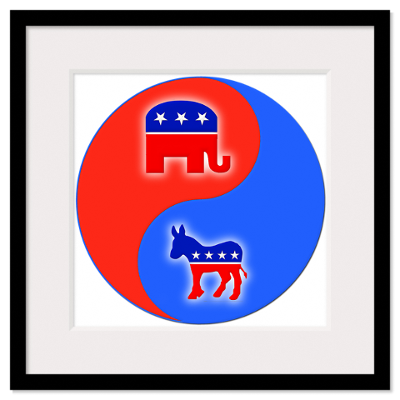
 |
NAVIGATION
|
NEWS TIPS!RightMichigan.com

Who are the NERD fund donors Mr Snyder?Tweets about "#RightMi, -YoungLibertyMI, -dennislennox,"

 |
Some Consensus Assembly RequiredBy Kevin Rex Heine, Section News
Gretchen Whitmer refers to it as a "civil war" (and Bill Ballenger tempers that to "controlled-fire civil war"); Todd Courser refers to it as "intense fellowship;" both Brian Calley and Wes Nakagiri refer to it as "a competition of ideas;" Saul Anuzis refers to it as "growing pains;" and Garrett Arwa cites it as evidence that the Michigan Republican Party is "coming apart at the seams."
Me? I think the truth is somewhere in the middle of all of that. I also think that these various characterizations dance around an interesting finding of the iCaucus Michigan survey, but which wasn't referred to in the press release in a way that would draw attention, and which by itself explains why a top-down approach to Michigan Republican Party unity is never going to work.

In the iCaucus survey, respondents were asked to self-identify what type of Republican they considered themselves to be. In providing some definition to the types of republicanism, we opted to define each using example pairs. In other words, when we think of "Conservative Republican," we naturally think of Ronald Reagan, but who else comes to mind that would serve as a defining example of what conservatism is? It was an all day debate amongst the iCaucus Michigan executive staff (literally all day, sunrise to sunset on the longest "day" of the year), not only as to what types of republicanism we'd offer, but also whom we'd use in which example pair. Mentioned in passing on page 2 of the PDF version of the press release (downloadable from this link), the philosophical breakdown of the Michigan Republican Party follows:
Now, of course, the leftist jackasses have picked up on this as evidence of an internal rift within the MIGOP, as have those within the party who seem to somehow insist on blind brand allegiance. (Trust me, we did get that feedback, and plenty of it.) And to that point I'm going to provide a citation that I've used before. In his book, The Five Dysfunctions of a Team, Patrick Lencioni identifies the fear of conflict - the desire to preserve an artificial organizational harmony at the expense of constructive and passionate ideological debate - as a classic symptom of an organization that is already failing. Productive organizations, in his view, embrace internal conflict and encourage honest dissent in the process of building a "disagree and commit" consensus. Quite frankly, I think that the hard numbers, showing that none of the five philosophical dispositions within the party has a majority presence statewide, present as sobering reality that the Michigan Republican Party leadership (both within the State Capitol Complex and within the Secchia-Weiser Republican Center) needs to routinely undertake the process of internal consensus building in order to get anything useful done. By extension, I mean to say that, properly handled, the internal philosophical and ideological debate is actually a healthy thing for the party going forward, and that squelching that debate for the sake of presenting "false front unity" damages party credibility, both short term and long term. To cite Mike Hewitt, host of The Renegade River Show, (WKBZ, 1090-AM, Muskegon, Michigan), part of that internal philosophical and ideological debate plays out, by design, in the primary process.
... a 'primary election' is the process that a political party uses to nominate a candidate that will then face candidates nominated by other parties in a general election. Resistance to a primary election indicates pre-existing consensus, internal apathy, or blind allegiance. There you go. So, even though the self-identified conservative republicans are the dominant plurality statewide within the Michigan Republican Party, they have to routinely undertake some coalition building with the other philosophical "schools of thought" within the party in order to build the necessary internal consensus before engaging the external opposition. And, naturally, tea party and liberty caucus leadership may say, "Aha! See, here's proof that the establishment has to work with us going forward!" Uh, no, not really. A sobering mathematical reality of the numbers (whether as a statewide aggregate or district-by-district) is that the conservative republicans don't have to work with either the libertarians or the tea partiers in order to obtain a working majority; they can accomplish that by cooperating with the moderate republicans. Howl all you want to, but if you don't have to votes to override that, then what are you gonna do about it? Now, just to be clear, I'm not by any stretch of the imagination saying that the libertarian republicans or the tea party republicans should compromise their core principles in order to build a working majority. What I am saying is that they ought to work on their approach a bit (including mastering the art of statesmanship) so as to make a persuasive case why they ought to be the ones that the conservatives partner with to advance the Michigan Republican agenda going forward. The "big stick" of a primary ouster has its uses, but is exponentially more effective as the iron hand within the velvet glove of the soft speech of policy negotiation. The way that I'm seeing it right now, especially given that the party base isn't all that stoked on the current "republican" governor, the honest leadership in the establishment is going to have to figure out how to persuade people that don't like very much to work together long enough to avoid a pachyderm shipwreck next year. Given that the libertarians and the tea partiers have at least a "critical mass presence" in every single district, and that they aren't all that sold on preserving the party brand unless doing so is preceded by an honest return to the party platform, maybe that's where TPTB ought to start.

Some Consensus Assembly Required | 0 comments ( topical, 0 hidden)
|